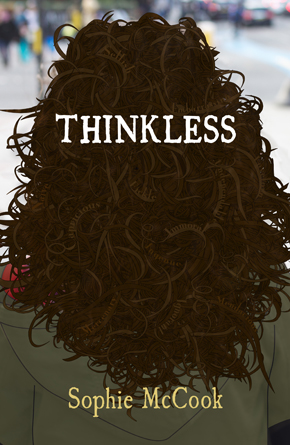Head on the block
by Sophie McCookThere’s a cartoon I saw once which shows a writer stepping into a ‘Manuscript Doctor’s Office’. The writer is suffering from a bad case of blockage. The doctor says, “Can I take a look at a sample of your prose, please?” The writer blanches: “I can’t just produce like that, here, with you staring at me!” The doctor sighs and indicates towards a door behind him. “Very well. Go into that private room, there’s a stack of inspiring material, and a few deadlines if you need them.”
As a freelance writer for fifteen years, I’ve spent a good deal more of my time not writing than writing. I also spend more time worrying about not writing. I place myself in a lot of potential writing situations and then, more often than not, just do a lot of sitting, fretting and procrastinating. I was asked to submit this short piece a month ago. In that time I have written about twenty Facebook updates, and from eBay I’ve bought a saxophone, a saxophone starter’s music book, a pair of lime-green leather pixie boots and a new ukulele. I even mopped the kitchen floor.
Blockage, if the cartoon is correct, is a pretty much off-the-shelf sensation for writers. I have two neural writing pathways that whizz around my brain like Hot Wheels cars. One loopy route is the notion that every word I write will be judged by critical people; publishers, reviewers, readers, producers, directors and some of my family. When my mind is stalling at the task in hand, sometimes each written word has to be carried to the page like a rugby ball being run through a well-drilled defensive line-up of critics. The second issue is the wide expanse that freelance writing gives you. There is no end of horizon. It’s a kind of writing agoraphobia. I have the notion that if some psycho gave me a stubby pencil, two napkins and two minutes, and said, “4,000 words or your hamster gets it,” I could probably write up a storm. There’s nothing like a straitjacket to make you want to escape.
The idea came to me that if I was going to flunk my degree, I should do it in the manner of a blockbuster disaster movie… I would write a novel one chapter a day and publish online, meaning I had no choice but to write.”
Four years ago I tried to break my writer’s fear of writing by starting an Open University Degree in English Literature. A year later, this had kicked off an essayist’s fear of essays. I asked for time extensions and stared at my computer screen. I may have once had an idea of “How Othello expresses masculine paradigms of his era, and in reflection, those of the current or eternal male experience” but during the summer of 2012, my mind was a high-voltage drone of short-circuiting Hot Wheels. This was when I decided that the only way out was a straitjacket and some punitive writing rules.
The idea came to me that if I was going to flunk an Open University degree, I should do it in the manner of a blockbuster disaster movie; like a wartime military sea captain going down with his ship, saluting and perhaps humming ‘The Liberty Bell’. If I wrote a novel, no one would mention the degree. What’s more, I would write it one chapter a day and publish each individual chapter online, meaning that I had no choice but to write. It was 1,000 words or day, or my hamster would get it.
I had the vaguest thread of a plot cluttering up the back of my cortex and a strongly defined heroine, so I started typing.
I named the blog Tiny Chapters on the Run. The running I was doing was away from the Open University, but it seemed to fit the protagonist who is in constant escape from her life. The rules I applied were that each chapter should work as a self-contained unit so that new readers would be intrigued. That each chapter should have a hook to drag readers to the next chapter. That each chapter should loosely fit to an over-arching plot (one that I had not quite figured out yet). Also, each chapter would be 1,000 words exactly (about one third of my time was devoted to editing up or down) and be submitted by midnight. A mixture of shackles and an obsessive fear of failing to submit strangely liberated me to write in free-fall – proof that mental tics can win you big.
I don’t know how it grew, because I don’t harvest social networks well, but my daily readership of around 180 suddenly rose to 700. The pressure to perform added grit to my road and I started to feel the first anxieties that inevitably turn into blockage and silence. Luckily, my protagonist Miriam was leading the way. She is a demanding girl and asked for situations to deal with. Miriam spent all summer living something like my own life, in a parallel universe. If I went to a wedding, she went to another. The weekend I was at a festival, so was she. She managed to have a much better time than I did; while I was sitting on a grassy bank, nodding gently to Fleet Foxes, she was climbing under barriers, vomiting into boots and having nervous breakdowns with sound engineers.
Bumping into friends or neighbours was a delicious mix of intimate and fantastical. As the plot unfolded daily, I fielded queries about Miriam’s wellbeing. Supermarkets suddenly became advice clinics for my leading lady.
By the end of eighty chapters, the novel was complete and I had scraped a pass in my English Literature second year. Some friends asked for paper copies of the book, which I had printed up. When they all sold, I printed more and then more again. The book has now found an actual publisher and is retitled Thinkless.
Writer’s block is still a part of my life, but at the very least, with straitjackets I know a way out. If you don’t believe me, try a wordcount of this piece (titling, sign-off and footnote not included), and join me in rejoicing with the crepuscular household critters of the world.*
* I don’t actually own a hamster.
 Sophie McCook has written for the BBC, Channel 4, independent film productions, as well as national magazines and newspapers. She lives in Findhorn, Scotland. Thinkless is published by Limehouse Books.
Sophie McCook has written for the BBC, Channel 4, independent film productions, as well as national magazines and newspapers. She lives in Findhorn, Scotland. Thinkless is published by Limehouse Books.
Read more.
sophiemccook.com


